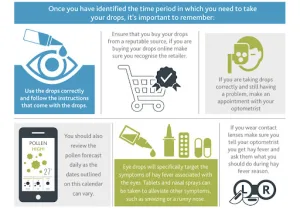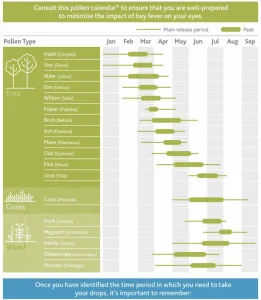Hay fever affects 1 in 5 of us at some point in our lifetimes. This seasonal condition is uncomfortable and can cause itchy, red, puffy or watery eyes, which can be a real misery. The culprit? Pollen.
What is Hay fever?
Hay fever begins when pollen enters the body through our mouth, nose and eyes. In people who suffer from hay fever, their body’s immune system identifies this pollen as a harmful invader.
Immune system cells, called mast cells, bind to the pollen and trigger an allergic response. This allergic response causes a substance called histamine to be released near the pollen particles. Histamine is designed to combat the harmful invader, pollen. It is this histamine that gives us our hay fever symptoms.
Symptoms of hay fever include watery eyes, runny noses and sneezing. It can also cause our eyes to become extremely itchy, red and puffy with a watery or stringy discharge.
When hay fever affects our eyes, it’s called seasonal allergic conjunctivitis, or vernal conjunctivitis. Don’t worry – this type of conjunctivitis is not contagious and can’t be passed from person to person.
Hay fever affects 1 in 5 People
People can be sensitive to different types of pollen, such as grass pollen, specific types of tree pollen, or a mixture. Tree Pollen affects approximately 25% of hay fever sufferers in the UK, whilst grass pollen affects almost 90%.
You can use the guide below to help identify what types of pollens cause your hay fever, indicated by the time of year that your hay fever flares up. For many, the hayfever season begins now and we see this with our patients presenting with red, watery, itchy or puffy eyes.

What can you do to prevent hay fever from affecting your eyes?
Looking after your eyes when you have allergies is important to prevent any long-lasting damage. Some things you can do include:
Avoid pollen
It is really useful if you can identify the types of pollen that you are allergic to. Avoiding these pollens is the most effective way of preventing allergic conjunctivitis. You can also check the pollen count forecast each day.
Wear close-fitting glasses
Wearing close-fitting glasses or sunglasses will help to prevent pollen particles from getting into your eyes. Wearing contact lenses can further irritate your eyes during hay fever season so choosing to wear glasses over lenses can be a good idea.
Adjust your contact lenses
Stop wearing contact lenses until your symptoms have ceased. Contact lenses can sometimes make your hay fever worse as they can trap pollen, keeping it close to your eyes. Contact lenses also cause gentle, unnoticeable rubbing each time we blink, which sometimes causes more histamine to build up.
If you are unsure about wearing your contact lenses during hay fever season you can book in to see your Optometrist or Contact Lens Optician, as swapping to a different contact lens material and wearing daily disposable contact lenses can help.
Use eye drops
You can see your pharmacist for eye drops that help to relieve any irritation caused by pollen.
Sodium cromoglycate eye drops are best taken before and continued through the hay fever season. They help prevent the mast cells in our eyes from binding to the pollen, which stops the histamine.
A course of antihistamine eye drops, such as Otrivine, is best if your hay fever has set in.
Don’t rub your eyes
Don’t touch or rub your eyes. As tempting as it is, this encourages more histamine, which equals more itching, redness or discharge.
Use a cold compress
Apply a cold compress to your eyes to help relieve hay fever symptoms.
Use a gel eye mask suitable for the fridge, or a cool wet flannel. Place over shut eyes for an instant, and wonderful relief.
Take oral antihistamines
Taking oral antihistamines can help your hay fever symptoms, from watery or itchy eyes to congestion and sneezing. Oral antihistamines can make our eyes feel dry, so you may also want to use dry eye drops whilst taking these. Speak to your Optometrist or Pharmacist for more advice.
Consult with your Optometrist at Reynolds Opticians Today
If you suffer from hay fever please stop in and visit your Optometrist at Reynolds & Slater for further advice, or if your hay fever symptoms do not improve.
Get in touch today to book an appointment with our friendly team, or book an appointment online.








